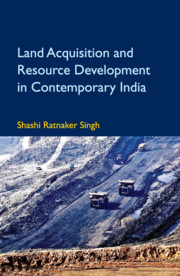Book contents
- Frontmatter
- Contents
- List of Figures
- List of Maps
- List of Tables
- List of Abbreviations
- Foreword
- Acknowledgements
- Part I Theoretical Framework
- 1 Introduction: From Colonial Regime to ‘Welfare State’?
- 2 State, Space and People
- 3 Land, Mines and Minerals
- 4 Land Acquisition and Resource Development in India
- 5 Resource Development and Compensation Issues
- Part II Case Study
- 6 Singrauli: A ‘Space’ of Dependence
- 7 Singrauli: A Development Dilemma
- 8 Administering Singrauli: Governance and Institutions
- 9 Land Acquisition and Its Socio-economic Implications: Field Survey
- Part III Analysis
- 10 Understanding Development
- 11 Conclusion
- Appendix: Memorandum from Mineral-Bearing States
- Bibliography
- Index
Appendix: Memorandum from Mineral-Bearing States
Published online by Cambridge University Press: 16 October 2020
- Frontmatter
- Contents
- List of Figures
- List of Maps
- List of Tables
- List of Abbreviations
- Foreword
- Acknowledgements
- Part I Theoretical Framework
- 1 Introduction: From Colonial Regime to ‘Welfare State’?
- 2 State, Space and People
- 3 Land, Mines and Minerals
- 4 Land Acquisition and Resource Development in India
- 5 Resource Development and Compensation Issues
- Part II Case Study
- 6 Singrauli: A ‘Space’ of Dependence
- 7 Singrauli: A Development Dilemma
- 8 Administering Singrauli: Governance and Institutions
- 9 Land Acquisition and Its Socio-economic Implications: Field Survey
- Part III Analysis
- 10 Understanding Development
- 11 Conclusion
- Appendix: Memorandum from Mineral-Bearing States
- Bibliography
- Index
Summary
Demands from the mineral-rich states (memo to the 12th Finance Commission [FC]), Jharkhand, Madhya Pradesh and Odisha, are as follows.
Jharkhand
The state government is of the opinion that Jharkhand has to be treated as the special case. In any devolution formulae, there will be states where the formula just ‘doesn’t fit’. Jharkhand has a heavy preponderance of natural resources, which are exploited by the central government, but at the same time give a faulty picture of the per capita GSDP of the state. In these special cases an alternative to the formula must be considered. (Finance Commission of India, 2004: 19)
Specifically with regard to mining, the memo to the 12th Finance Commission says,
Incessant mining by the central government agencies has had 3 adverse effects on the state:
The land used for mining cannot be put to any productive use once the mining is complete;
Human suffering because of displacement is a tremendous burden that needs to be compensated through an adequate rehabilitation package;
The ecological and environmental impact of mining is irreparable and the state should be compensated for the same.
At present there is no national programme to compensate the states for the irreparable damage caused by mining activities. The royalty that is paid to the state government is inadequate considering the huge loss that the state is suffering. The necessity to arrive at a fair royalty is critical for the state and should not be dealt as a commercial activity only, but should also consider the ecological and social aspects of mining. (Ibid.)
Madhya Pradesh
Views on coal royalty:
We would like to examine and refuse the popular counter arguments that have so far been used to resist correcting this gross injustice to coal bearing states. One popular counter argument against increase in the rate of royalty has been that it leads to an increase in the landed price of coal. The landed price comprises the pithead price, royalty, other cess, freight and taxes. The share of royalty in the landed price of coal is not very significant. The economic impact of increase in landed price due to any of its components is same on the performance of the coal consuming industries.
- Type
- Chapter
- Information
- Land Acquisition and Resource Development in Contemporary India , pp. 233 - 235Publisher: Cambridge University PressPrint publication year: 2021



